Mbed OS Device Management example for various ST boards.
DEPRECATED
This example application is not maintained and not recommended. It uses an old version of Mbed OS, Pelion DM and Arm toolchain. It doesn't work with Mbed Studio.
Please use: https://os.mbed.com/teams/mbed-os-examples/code/mbed-os-example-pelion/
This example is known to work great on the following platforms:
- DISCO_L475E_IOT01A - onboard WiFI and onboard QSPI flash. Board specific example using onboard sensors is available here.
- DISCO_F413H - onboard WiFI and onboard QSPI flash.
- DISCO_F469NI - WizFi310 WiFI shield and onboard QSPI flash (see WiFi shield instructions).
- DISCO_F746NG - onboard Ethernet and using onboard QSPI flash.
- DISCO_F769NI - onboard Ethernet and using onboard QSPI flash.
- DISCO_L496AG - WizFi310 WiFI shield and onboard QSPI flash (see WiFi shield instructions).
- NUCLEO_F207ZG - onboard Ethernet and wired SD card (SD card wiring instructions).
- NUCLEO_F412ZG - WizFi310 WiFI shield and SD card shield (see WiFi shield instructions).
- NUCLEO_F429ZI - onboard Ethernet and wired SD card (SD card wiring instructions).
- NUCLEO_F746ZG - onboard Ethernet and wired SD card (SD card wiring instructions).
- NUCLEO_F767ZI - onboard Ethernet and wired SD card (SD card wiring instructions).
- NUCLEO_L476RG - WizFi310 WiFI shield and SD card shield (see WiFi shield instructions).
- NUCLEO_L496ZG - WizFi310 WiFI shield and SD card shield (see WiFi shield instructions).
- NUCLEO_L4R5ZI - WizFi310 WiFI shield and SD card shield (see WiFi shield instructions).
Follow the Quick-Start instructions: https://cloud.mbed.com/quick-start
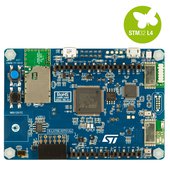
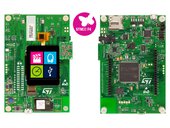

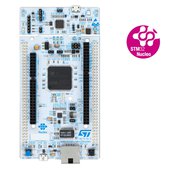
Example functionality
This example showcases the following device functionality:
- Read ADC temperature and ADC vref, and report them as Pelion LWM2M resources (see image below).
- On user button click, increment Pelion LWM2M button resource.
- Allow the user to change the state of the board LED from Pelion LWM2M led_state resource and PUT request.
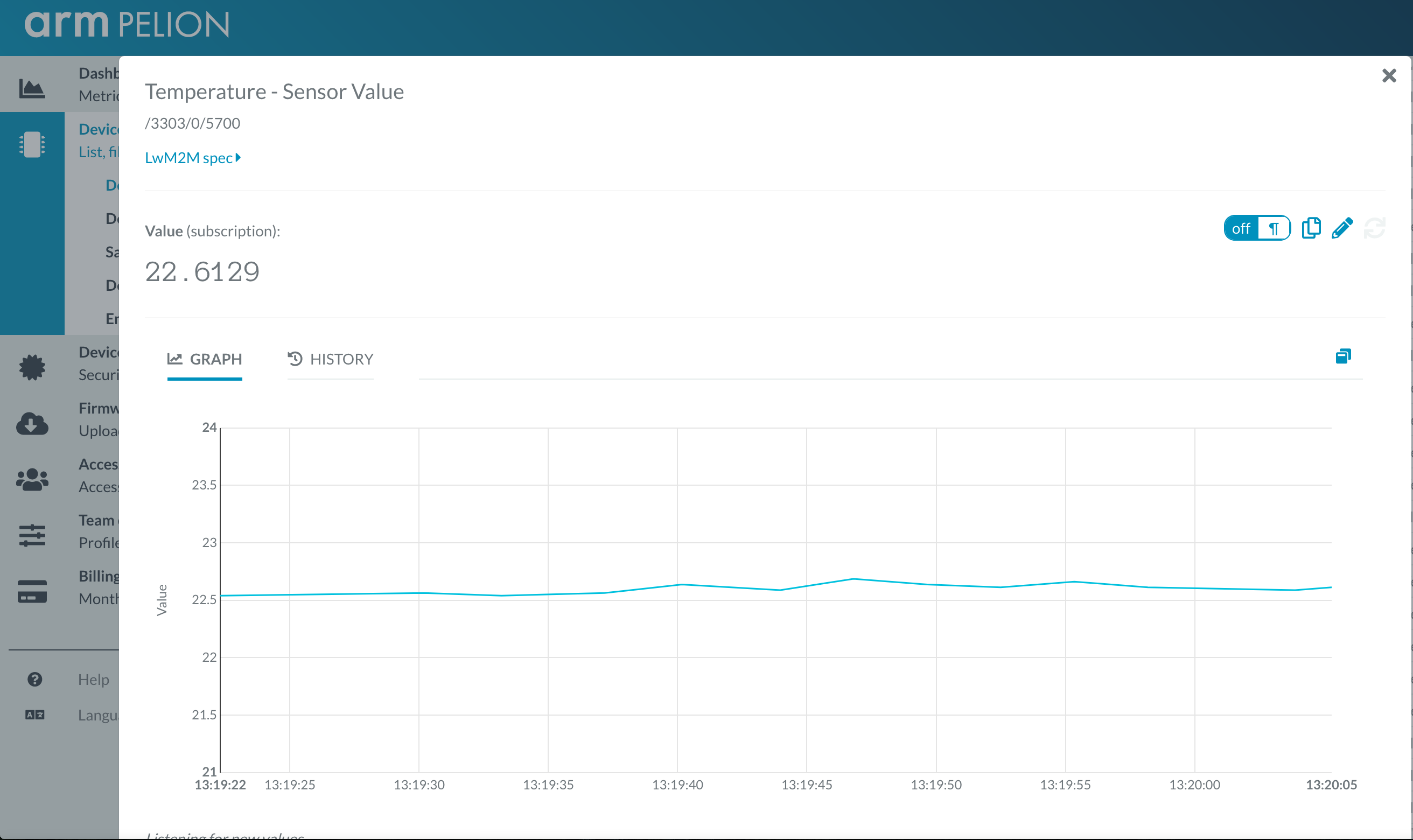
SD card wiring
The ST Nucleo family of boards don't have storage onboard and therefore you will need an SD card. A limitation on ST Nucleo 144 boards is that there's a conflict between Ethernet and SPI pins on Arduino D11. Due to this, the SD card must be wired to different SPI bus that doesn't conflict with other functionality. The image below provide instructions on how to wire an SD card to a non-conflicting SPI instance.
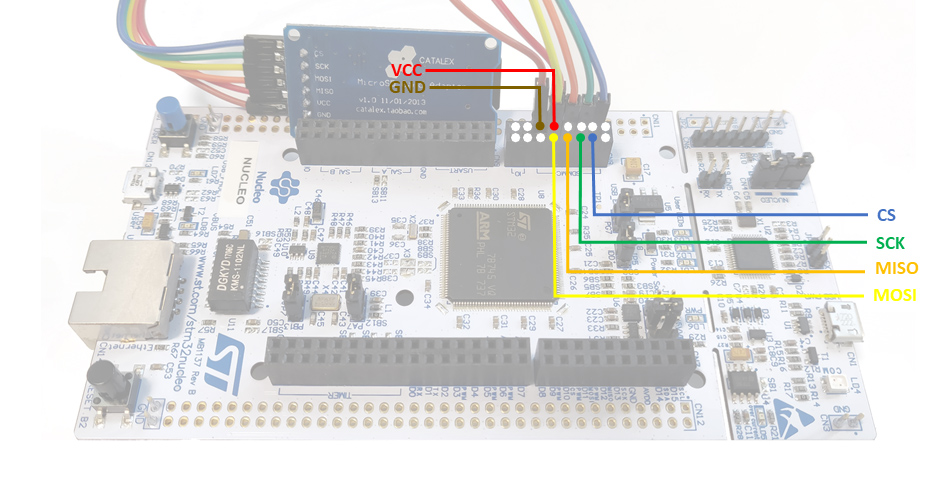
If you are not a first-time Pelion Device Management user your device's SD card may already have connect and update certificates on it. If this is the case, remove and manually format your micro SD card, flash the binary to the device and then re-insert your micro SD card.
WiFi shield setup/wiring
Some ST Nucleo and Discovery boards don't have IP connectivity option, but bundled with a WiFi shield, they can take benefit of full device management capabilities. See links to reference images below on how to wire WizFI310 WiFi shield and/or SD card shield:
- ST DISCO_F469NI + WizFi310 WiFi Shield
- ST DISCO_L496AG + WizFi310 WiFi Shield
- ST NUCLEO_F412ZG + WizFi310 WiFi Shield + SD card shield
- ST NUCLEO_L476RG + WizFi310 WiFi Shield + SD card shield
- ST NUCLEO_L496ZG + WizFi310 WiFi Shield + SD card shield
- ST NUCLEO_L4R5ZI + WizFi310 WiFi Shield + SD card shield
Use this example with Mbed CLI
1. Import the application into your desktop:
mbed import /teams/ST/code/pelion-example-common cd pelion-example-common
2. Install the CLOUD_SDK_API_KEY
mbed config -G CLOUD_SDK_API_KEY <PELION_DM_API_KEY>
For instructions on how to generate your API key, please see the documentation.
3. Initialize firmware credentials (done once per repository). You can use the following command:
mbed dm init -d "<your company name in Pelion DM>" --model-name "<product model identifier>" -q --force
If above command do not work for your Mbed CLI, please consider upgrading Mbed CLI to version 1.8.x or above.
4. Compile and program:
mbed compile -t <toolchain> -m <TARGET_BOARD>
(supported toolchains : GCC_ARM / ARM / IAR)
Diff: main.cpp
- Revision:
- 1:37392c1b4cf8
- Parent:
- 0:ea30ba97a865
- Child:
- 4:05845431da95
--- a/main.cpp Mon Dec 10 20:14:17 2018 +0000
+++ b/main.cpp Mon Dec 10 20:49:49 2018 +0000
@@ -20,38 +20,48 @@
#include "mbed.h"
#include "simple-mbed-cloud-client.h"
#include "FATFileSystem.h"
+#include "LittleFileSystem.h"
// An event queue is a very useful structure to debounce information between contexts (e.g. ISR and normal threads)
// This is great because things such as network operations are illegal in ISR, so updating a resource in a button's fall() function is not allowed
EventQueue eventQueue;
-// Default block device
-BlockDevice *bd = BlockDevice::get_default_instance();
-FATFileSystem fs("fs");
-
// Default network interface object
NetworkInterface *net = NetworkInterface::get_default_instance();
-// Declaring pointers for access to Pelion Device Management Client resources outside of main()
-MbedCloudClientResource *button_res;
-MbedCloudClientResource *pattern_res;
+// Default block device
+BlockDevice *bd = BlockDevice::get_default_instance();
+SlicingBlockDevice sd(bd, 0, 2*1024*1024);
+LittleFileSystem fs("fs", &sd);
-// This function gets triggered by the timer. It's easy to replace it by an InterruptIn and fall() mode on a real button
-void fake_button_press() {
- int v = button_res->get_value_int() + 1;
+// Default User button for GET example
+InterruptIn button(USER_BUTTON);
+// Default LED to use for PUT/POST example
+DigitalOut led(LED1);
+// Default temperature reading from microcontroller
+AnalogIn adc_temp(ADC_TEMP);
+// Voltage reference from microcontroller
+AnalogIn adc_vref(ADC_VREF);
- button_res->set_value(v);
+#define SENSORS_POLL_INTERVAL 1.0
- printf("Simulated button clicked %d times\n", v);
-}
+// Declaring pointers for access to Pelion Client resources outside of main()
+MbedCloudClientResource *res_button;
+MbedCloudClientResource *res_led;
+MbedCloudClientResource *res_temperature;
+MbedCloudClientResource *res_voltage;
+
+// When the device is registered, this variable will be used to access various useful information, like device ID etc.
+static const ConnectorClientEndpointInfo* endpointInfo;
/**
* PUT handler
* @param resource The resource that triggered the callback
* @param newValue Updated value for the resource
*/
-void pattern_updated(MbedCloudClientResource *resource, m2m::String newValue) {
+void led_put_callback(MbedCloudClientResource *resource, m2m::String newValue) {
printf("PUT received, new value: %s\n", newValue.c_str());
+ led = atoi(newValue.c_str());
}
/**
@@ -61,27 +71,18 @@
* Note that the buffer is deallocated after leaving this function, so copy it if you need it longer.
* @param size Size of the body
*/
-void blink_callback(MbedCloudClientResource *resource, const uint8_t *buffer, uint16_t size) {
- printf("POST received. Going to blink LED pattern: %s\n", pattern_res->get_value().c_str());
-
- static DigitalOut augmentedLed(LED1); // LED that is used for blinking the pattern
+void led_post_callback(MbedCloudClientResource *resource, const uint8_t *buffer, uint16_t size) {
+ printf("POST received. Going to blink LED pattern: %s\n", res_led->get_value().c_str());
+ led = atoi(res_led->get_value().c_str());
+}
- // Parse the pattern string, and toggle the LED in that pattern
- string s = std::string(pattern_res->get_value().c_str());
- size_t i = 0;
- size_t pos = s.find(':');
- while (pos != string::npos) {
- wait_ms(atoi(s.substr(i, pos - i).c_str()));
- augmentedLed = !augmentedLed;
-
- i = ++pos;
- pos = s.find(':', pos);
-
- if (pos == string::npos) {
- wait_ms(atoi(s.substr(i, s.length()).c_str()));
- augmentedLed = !augmentedLed;
- }
- }
+/**
+ * Button function triggered by the physical button press.
+ */
+void button_press() {
+ int v = res_button->get_value_int() + 1;
+ res_button->set_value(v);
+ printf("Button clicked %d times\n", v);
}
/**
@@ -99,58 +100,116 @@
*/
void registered(const ConnectorClientEndpointInfo *endpoint) {
printf("Connected to Pelion Device Management. Endpoint Name: %s\n", endpoint->internal_endpoint_name.c_str());
+ endpointInfo = endpoint;
}
+/**
+ * Update sensors and report their values.
+ * This function is called periodically.
+ */
+void sensors_update() {
+ float temp = adc_temp.read()*100;
+ float vref = adc_vref.read();
+ printf("ADC temp: %6.4f C, vref: %6.4f %%\r\n", temp, vref);
+ if (endpointInfo) {
+ res_temperature->set_value(temp);
+ res_voltage->set_value(vref);
+ }
+}
+
+
int main(void) {
printf("Starting Simple Pelion Device Management Client example\n");
- printf("Connecting to the network...\n");
+
+ // If the User button is pressed ons start, then format storage.
+ const int PRESSED = 1;
+ DigitalIn *user_button = new DigitalIn(USER_BUTTON);
+ if (user_button->read() == PRESSED) {
+ printf("User button is pushed on start. Formatting the storage...\n");
+ int storage_status = fs.reformat(&sd);
+ if (storage_status != 0) {
+ if (sd.erase(0, sd.size()) == 0) {
+ if (fs.format(&sd) == 0) {
+ storage_status = 0;
+ printf("The storage reformatted successfully.\n");
+ }
+ }
+ }
+ if (storage_status != 0) {
+ printf("ERROR: Failed to reformat the storage (%d).\n", storage_status);
+ }
+ }
// Connect to the internet (DHCP is expected to be on)
- nsapi_error_t status = net->connect();
+ printf("Connecting to the network using Wifi...\n");
+ net = NetworkInterface::get_default_instance();
- if (status != NSAPI_ERROR_OK) {
- printf("Connecting to the network failed %d!\n", status);
+ nsapi_error_t net_status = -1;
+ for (int tries = 0; tries < 3; tries++) {
+ net_status = net->connect();
+ if (net_status == NSAPI_ERROR_OK) {
+ break;
+ } else {
+ printf("Unable to connect to network. Retrying...\n");
+ }
+ }
+
+ if (net_status != NSAPI_ERROR_OK) {
+ printf("ERROR: Connecting to the network failed (%d)!\n", net_status);
return -1;
}
printf("Connected to the network successfully. IP address: %s\n", net->get_ip_address());
- // SimpleMbedCloudClient handles registering over LwM2M to Pelion Device Management
+ // SimpleMbedCloudClient handles registering over LwM2M to Pelion DM
SimpleMbedCloudClient client(net, bd, &fs);
int client_status = client.init();
if (client_status != 0) {
- printf("Pelion Client initialization failed (%d)\n", client_status);
+ printf("ERROR: Pelion Client initialization failed (%d)\n", client_status);
return -1;
}
// Creating resources, which can be written or read from the cloud
- button_res = client.create_resource("3200/0/5501", "button_count");
- button_res->set_value(0);
- button_res->methods(M2MMethod::GET);
- button_res->observable(true);
- button_res->attach_notification_callback(button_callback);
+ res_button = client.create_resource("3200/0/5501", "button_count");
+ res_button->set_value(0);
+ res_button->methods(M2MMethod::GET);
+ res_button->observable(true);
+ res_button->attach_notification_callback(button_callback);
+
+ res_led = client.create_resource("3201/0/5853", "led_state");
+ res_led->set_value(1);
+ res_led->methods(M2MMethod::GET | M2MMethod::PUT);
+ res_led->attach_put_callback(led_put_callback);
- pattern_res = client.create_resource("3201/0/5853", "blink_pattern");
- pattern_res->set_value("500:500:500:500:500:500:500:500");
- pattern_res->methods(M2MMethod::GET | M2MMethod::PUT);
- pattern_res->attach_put_callback(pattern_updated);
+ // Sensor resources
+ res_temperature = client.create_resource("3303/0/5700", "temperature");
+ res_temperature->set_value(0);
+ res_temperature->methods(M2MMethod::GET);
+ res_temperature->observable(true);
- MbedCloudClientResource *blink_res = client.create_resource("3201/0/5850", "blink_action");
- blink_res->methods(M2MMethod::POST);
- blink_res->attach_post_callback(blink_callback);
+ res_voltage = client.create_resource("3316/0/5700", "voltage");
+ res_voltage->set_value(0);
+ res_voltage->methods(M2MMethod::GET);
+ res_voltage->observable(true);
printf("Initialized Pelion Client. Registering...\n");
// Callback that fires when registering is complete
client.on_registered(®istered);
- // Register with Pelion Device Management
+ // Register with Pelion DM
client.register_and_connect();
- // Placeholder for callback to update local resource when GET comes.
+ int i = 600; // wait 60 seconds
+ while (i-- > 0 && !client.is_client_registered()) {
+ wait_ms(100);
+ }
+
+ button.fall(eventQueue.event(&button_press));
+
// The timer fires on an interrupt context, but debounces it to the eventqueue, so it's safe to do network operations
Ticker timer;
- timer.attach(eventQueue.event(&fake_button_press), 5.0);
+ timer.attach(eventQueue.event(&sensors_update), SENSORS_POLL_INTERVAL);
// You can easily run the eventQueue in a separate thread if required
eventQueue.dispatch_forever();

